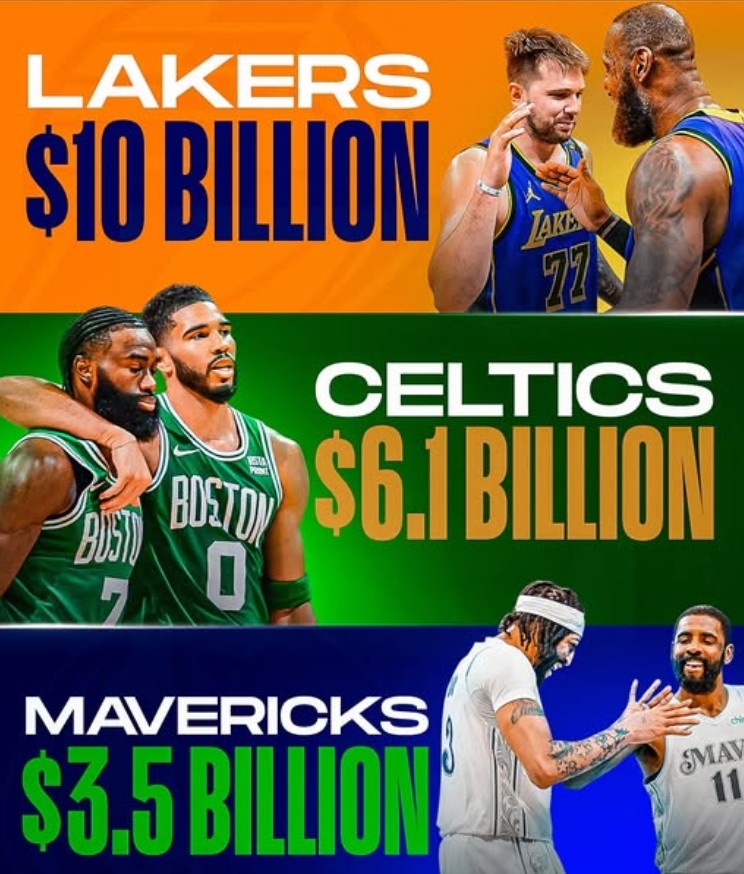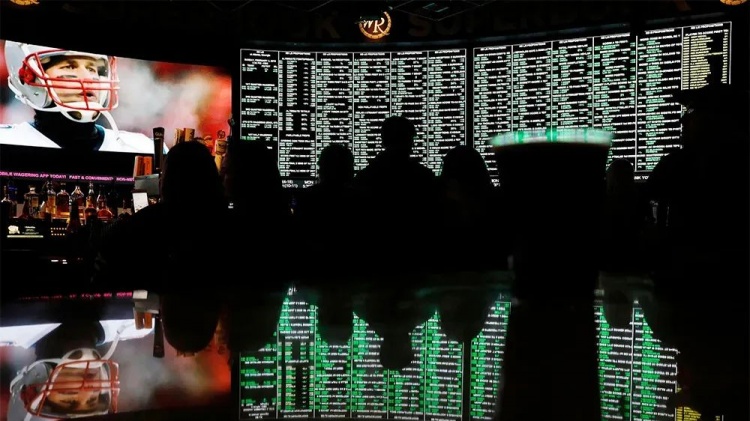When you win the championship, you want to sell the team?
The Oklahoma City Thunder turned out to be the Boston Celtics script.
Shortly after winning the first championship in the team history, the local media Le Monde in Russia reported that a source close to Thunder boss Clay Bennett revealed that "the team shareholders are likely to sell the team soon."
This scene seems familiar. After the Celtics won the 2024 NBA championship, they transferred the deal for $6.1 billion on March 20, 2025, setting a record for North American professional sports team transactions.
But less than three months later, on June 19, the Los Angeles Lakers sold most of their shares for $10 billion, setting a new record, and becoming the most expensive professional team in the world to change hands.

NBA team trading records have repeatedly set new highs
NBA's yellow and green battle has been involved in the investment world. The number and amount of investment in professional teams in recent years is evident. A large amount of funds flowed to high-quality leagues and teams, and this record of the highest transaction may be refreshed again in the near future. Such a scene was simply unimaginable ten years ago.
"In 2015, when I founded Bruin Capital, there were probably only one or two people who were really watching the sports track, but now there are about 25-30 institutions paying attention." George Pyne, founder of Bruin Capital, said in an interview with Front Office Sports. The reason why professional teams have become popular investment targets is that their valuations continue and soar rapidly is certainly a major factor in attracting investors, but the opening of a small portion of the team's equity investment to private equity funds and other institutions is the best way to revitalize the investment situation of professional teams.
According to statistics conducted by JPMorgan in 2024, since 2004, the average valuation of NFL teams has increased by 523%, reaching US$5.1 billion; the average valuation of NBA teams has increased by 1176%, reaching US$3.8 billion; the average valuation of MLB teams has increased by 631%, reaching US$2.4 billion; the average valuation of NHL teams has increased by 714%, reaching US$1.3 billion.
This means that in the four major professional sports leagues in the United States, even a small part of the equity costs tens of millions or even hundreds of millions of dollars. Buyers without certain economic strength cannot afford it, which indirectly limits the flexibility of the circulation of equity of professional teams.
Therefore, since 2019, many North American professional sports leagues have successively lifted restrictions on private equity funds investing in teams. Even the most "stubborn" NFL and NCAA have begun to contact private equity funds in the past two years, preparing for the lifting of restrictions in the future. After entering the market, private equity funds absorb a small part of their equity through their funds, gradually form their own professional team investment portfolio and gain high returns.
According to Sportico, Dyal Capital Partners acquired part of the equity of the NBA Phoenix Suns at a valuation of $1.55 billion in July 2021, and then exited at a valuation of $4 billion in February 2023, with a return on investment of up to 158% in about 18 months.
Although the valuation of professional teams has been rising all the way, if they are not cashed in, it will be just a cold string of numbers. The operation of private equity funds for professional team equity assets has allowed the team's valuation to be tested in the real market.
High return rate proves that the prospect of investing in professional teams is good, which will naturally attract more private equity funds to join the market. It will also promote billionaires who are interested in investing in professional teams but are hesitant to be hesitant because of their high valuation.

At the same time, as many professional sports leagues open up a small number of equity investments in teams, professional team assets are also entering the era of group-based and large-scale operations.
David Blitzer, an executive of the investment company Blackstone Group and co-founder of Harris Blitzer Sports Entertainment, has a lot of experience.
According to Business Insider, Bulitzer is the first person to own a team stake in all five professional sports leagues in the United States, including controlling the NBA Philadelphia 76ers and the NHL New Jersey Devils through Harris Bulitzer Sports Entertainment, and holding shares in the NFL Washington Commanders, MLB Cleveland Guardians and MLS Royal Salt Lake City.
Blitzer's professional team asset layout is more than that, and he also invested in the NWSL Utah Royals and the Premier League Crystal Palace.
"We have rich experience in spin-offs, introducing new management teams, and designing incentive plans. I think these are measures that have never been tried in the sports circle before," Bulitzer said in an interview with Business Insider.
Holding many professional team assets, Bulitzer chose to package all the team's rights and interests, and use more weight to lead teams that are not as famous as teams, which will enhance their voice and benefits when negotiating with the brand. Earlier this year, Kampot Soup Company reached a cooperation agreement with Commanders, 76ers, Devils, and Joe Gibbs Racing.
In addition, with a bunch of professional teams in hand, Bulitzer can also share the cost of use when using cutting-edge operation tools such as artificial intelligence and data analysis, which can accurately reduce costs and increase efficiency.
Mark Walter, the new owner of the Lakers and CEO of TWG Global, also owns a number of professional teams, including the MLB Los Angeles Dodgers, WNBA Los Angeles Sparks, etc..
Walter's professional team assets are mostly concentrated in the Los Angeles area, and the linkage effect will be more obvious. For example, the stars of each team can watch each other's matches and create topics, which is very attractive to brands that aim to deepen their efforts in the Los Angeles market.
Essentially, investing in and operating professional teams is actually doing IP business.
However, professional teams are quite special. Their sports content dissemination, commercial rights development, and emotional connections with fans must revolve around the core of live broadcast game content. This is the difference between them and other IPs. Sports events can retain audiences for a specific period of time and allow them to focus on the arena, which is very attractive to the brand.
"Sports content is the lifeblood of the media industry and also gives professional teams extremely high value." Lori Bistis, head of sports business at PwC, said in an interview with CNN.
Bulitzer also bluntly stated when communicating with Business Insider, "These (professional teams) are part of the content and media industry. They have the best IPs in the world. In the live broadcast field, no other content may be more valuable than them."

Bulitzer's group and large-scale operation of its professional team assets represents the new ideas for the operation of professional teams at present, and the pure family management model may become less and less in the future.
First of all, with the valuation and transaction prices of North American professional teams hitting new highs, with transaction prices of billions and tens of billions of dollars, except for extremely wealthy big bosses like Steve Ballmer, it is difficult to acquire a professional team with just one person’s financial resources. If you choose to join forces to acquire, you will naturally transition to a group model in terms of team management and operation.
Secondly, now managing professional teams is an asset worth hundreds of millions or even dozens of billions of dollars, involving many aspects of income. It is difficult to rely solely on the boss and his family’s full power as before, and a larger and more professional management team is required to intervene.
Take the NBA as an example. In the past, the team's operating income was relatively fixed, namely tickets, peripherals, brand sponsorship, TV broadcast copyright sharing, league revenue sharing, etc., but now the team's revenue will be affected by more new things, such as streaming platforms such as YouTube, ESPN, and Amazon push up league copyright revenue, and the legalization of sports betting drives team sponsorship revenue growth.
These are still new things for professional sports. The relevant issues involved in the law, specific operations, etc. must be responsible for those who understand the new trends of change and have relevant professional knowledge.

streaming and other factors have greatly affected the league's revenue, and many NBA teams last changed hands in the 1990s, including the New York Knicks, the Indiana Pacers, etc. This means that most of the people in power in the team are old. If the descendants are unwilling to run the team, it is reasonable to take advantage of the current valuation and cash out and leave the market. To take on these behemoths with very high valuations, it is naturally necessary to rely on billionaires and fund groups. These people also have management teams behind them, and they will manage the team more in-depth.
But driven by this new idea, new bosses are likely to pursue maximization of interests when taking over the team and put return on investment first, which will easily lose some humanity.
At the beginning, the story of the Bass family sympathizing with "Magic" Johnson, Kobe Bryant and others was often praised by fans and also helped the Lakers attract stars.
On the other side, after Mark Cuban sold most of the Dallas Mavericks' equity, the new boss soon traded Luka Doncic, the star who led the team back to the finals, which aroused strong dissatisfaction from fans. If Cuban was still the team owner at the time, this transaction would most likely not have happened.
It can be seen that although new trends have gradually formed when managing professional teams with group-based and large-scale financial thinking, the team may not have enough in-depth understanding of team culture, fan feelings, etc., and some decisions are likely to cause negative public opinion.
Professional sports is a business, but it also affects the emotions of many people. How to balance running the team and taking into account human feelings, new bosses of professional sports still need to learn and grasp the right standards.
7M vn